RICHARD MOSS, MD - A Story
Brief Bio: A Lyrical Synopsis
The Early Years
I began my creative writing career by forging notes to explain absences from Columbus High School in the Bronx back in the early seventies. My friend, Johnny Dick (he has since changed his last name to protect his children from all that he endured) and I sailed right past the bus stop for Columbus on Pelham Parkway on Thursdays and Fridays (national holidays) headed for City Island to enjoy chips and shrimp on the beach. It was in line with prevailing wisdom about school and discipline and life in general at the time.


But the great borough of “the Bronx” (the only borough with the definitive article), that raucous, turbulent crucible of ethnicity and municipality, has always been a part of me, the theater within which the early dramas of my youth played out, a force in itself. That, along with my family, most particularly, my mother, a pugnacious woman who raised her five sons with no money, no education, and no resources save her indomitable will (this, before the age of the “single parent”), made me, I guess, what I am today.
By any American standard, we were “poor,” although we never considered ourselves as such. It was not in our lexicon. But there were five boys (I was fourth son) and my mother in a two bedroom (one bathroom) apartment. Mom was a receptionist. She and my father had divorced, and what little money he sent quickly dried up (he subsequently died at an early age).
But not once, I should mention (because it is significant for the evolving conservative narrative), did my mother consider “relief,” (“welfare” today). There was high stigma for such a choice at the time, and today I am thankful that she didn’t, for who knows what reflexes and instincts for survival would have been blunted had my brothers and I grown up wards of the state.

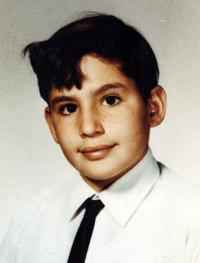
Not that we didn’t have our problems. For, despite Mom’s best efforts, the manners and habits of the times did invade our lives. One brother was mainlining heroin and ingesting an impressive medley of other mind bending opiates and hallucinogens until he found God in the world of Yoga. Another was into coke and still another into booze. One brother received a college degree. One completed High School. Two dropped out. Somehow they found their way.
Judaism
My mother was an intensely proud Jew although we did not have an observant home. She lit the Sabbath candles Friday nights, went to synagogue for the holidays, and managed bar mitzvahs for four of us (the youngest missed out). She was also a devoted Zionist and donated whatever she could to Jewish and Israeli causes. She never visited Israel because she could not afford to but instilled in me a love of the old Hebrew faith and the Jewish homeland.
The tales she wove of our great ancestors, the patriarchs, the warriors, and the prophets, stirred my young soul and filled me with the breadth and grandeur of our storied past. I saw them all as relatives, distant yes, but still members of the same extended family. Like many young Jews at the time, though, I fell under the sway of more exotic fare emanating from the East, specifically Yoga and then Buddhism. My love of Judaism would resurface later as would my allegiance to Israel.
Boyhood Heroes and the Yankees
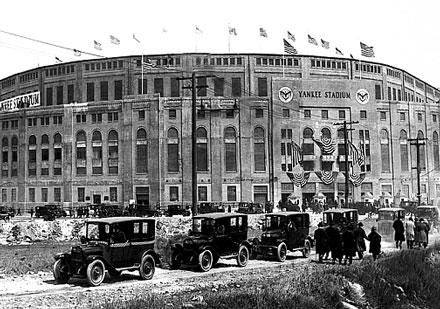
I cannot speak of my early years without mentioning the Yankees, for they were the air I breathed and the milk I supped. Mickey Mantle was my hero. Yankee Stadium was my shrine. My room was papered with Mickey Mantle clippings, photos and other paraphernalia, and, indeed, I went to sleep dreaming of Mickey and the Yanks. My devotion was on the order of religion - incredible when you realize that I came of age at what must have been the worst time to be a Yankee fan – when they were being embarrassed by the upstart cross town rivals, the hapless Mets who “miraculously” won it all in 1969, an unbearable humiliation.
Another miserable year was 1965, when Mantle began his long twilight decline (the lean years were also beginning for the Yankees who would finish sixth that year and tenth the next) while Willie Mays, his archrival, the great centerfielder for the San Francisco Giants, was having an MVP year. This led to, among other things, a fist fight between me and a Mays fan in a laundromat as I stepped forward to defend Mantle’s honor after a barrage of disparaging insults from the lout whom I happily dispatched.

In later years, particularly after 9/11, I came to see and write about the Yankees as America’s team, as a metaphor and symbol of American greatness and preeminence. As I saw it (and still do), to be a Yankee fan was to be a patriot. And I can tell you that in my travels around the world, in Asia, Central and South America, North Africa and elsewhere, in the most unlikely of places, I have seen young boys wearing New York Yankee baseball hats – and only Yankee hats. American symbol and icon indeed.
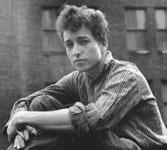
I also idolized Bob Dylan (and still do). I waited with bated breath for each new album and ran to the record department at Alexander’s on Fordham Road to buy it as soon as it came out. I spent hours analyzing and interpreting his lyrics, asking the age old question, what did Dylan (the Jewish folk prophet) mean? The image of Dylan with the rainbow hair by Phil Glazer, occupied the ceiling space right above my bed.
Another boyhood hero was Muhammad Ali. I watched the Ali-Foreman fight (in Zaire) on closed circuit in a theater in a black neighborhood. My brother, Lonnie, and I were the only whites. The place went nuts when he knocked Foreman out. Thereafter, I could be found doing the rope-a-dope like everyone else.

Blacks
I grew up with blacks. They were among my closest friends. We hung out together at PS 86 shooting hoop and at my house on Friday and Saturday nights getting high. They called me “Brother Richard” and we were as loyal to each other as could be. Some came from Harlem, taking the train up to the Bronx, part of the effort then to “integrate” public schools. Most came from the Marble Hill Projects in upper Manhattan just across the river. I have lost touch with all of them but remember them well.
My friendship with blacks from that era and fiery support of typical black/left wing causes at the time has not tempered my realization that racism is emphatically not at the heart of the range of problems affecting the black community today (poverty, crime, violence, educational failure…) but rather a variety of self inflicted, destructive behavioral patterns centered around a crushing rate of illegitimate births, noxious role models, negative attitudes towards education, a “victim” mentality, and entrenched habits of dependency, these the bitter harvest of forty years of misguided liberal social policies.
My background as a former street kid from the Bronx (with numerous black friends) whose single parent family was engulfed by drugs and other urban afflictions, allows me, I feel, to speak credibly and honestly about racial matters.
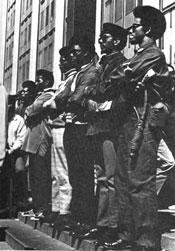
Drugs and the Counterculture

Drugs were rampant in the Bronx in the giddy, crazed, hippy days of the sixties and seventies. There were no friends I knew of that escaped its enticements, except perhaps the “greasers” who opted for beer. As if a harbinger of sordid things to come, I can recall a science teacher in eighth grade at JHS 143 sermonizing about the dangers of marijuana while, unbeknownst to him, the class junkie was snorting heroin in the back of the room.
It hit my generation hard but really smacked an older brother’s age group right between the eyes. It seemed as if every kid in our heavily Jewish neighborhood was getting stoned. I remember the bewilderment of responsible, loving parents who had sacrificed to raise their children properly only to watch them go up in smoke, so to speak, consumed by the now dominant and destructive norms of the counterculture. Good little Jewish boys and girls from stable Jewish homes now dressed like slobs with beads and sandals and other totems of the age, listening to wild music, speaking a bizarre new idiom, and using all manner of mind altering substances including quite commonly heroin.
There were many casualties, including at least four kids from the neighborhood, two of whom were close friends, that went to sleep and never woke up. All part of the legacy of the sixties, the decade that Lefties hearken back to nostalgically as their greatest years.
Left Wing Flirtations
Like many Jews of that era (and today), I was drawn to the left side of the political spectrum. I wrote for an “underground” newspaper in High School, was a student activist, protested the Vietnam War, supported the Black Panthers and the SDS (the radical “Students for a Democratic Society”), announced in an English class that Ho Chi Minh, the Communist dictator of North Vietnam, was my hero, gave teach-ins at schools, burned my books, had long hair, referred to police as “pigs,” the whole obnoxious, stupid mess.

But by age 18, I had given up drugs and decided that nihilistic, pampered, America-hating, Commie loving Left wing nuts were a little too rich for my blood.
I remember, for example, speaking with some bearded loon at a “socialist petition drive” who was urging “violent revolution.”
I asked him whom he wanted to kill, favoring, as he openly stated, violent revolution. He became agitated. When I suggested, sardonically, my teacher, the cop on the street, or my Uncle Saul, a successful “capitalist,” all legitimate examples of the “status quo” against which he railed, the absurdity of his position was evident.
The Liberalism of FDR, Truman, and JFK, a pragmatic, reform minded governing philosophy that stood for the working man and defended liberty abroad, would become a victim of this sinister movement, ultimately taken over (in 1972, the McGovern year) by the anti-American, anti-Capitalist, hard Left.
Their rabid, incoherent nostrums (which persist) along with the ruinous mores and conventions of the counterculture, of which I had previously been a fan and participant, began to turn my stomach.
Yoga & Buddhism

An older brother had drug problems. A cousin of ours (May his memory be a blessing), a former addict himself, ran a drug rehab center on the Lower East Side. He introduced my brother to Swami Rudrananda (“Rudi”), a powerful Yoga teacher. Rudi, a Jew, by the way, from Brooklyn (May his memory be a blessing), had Yoga ashrams around the country including lower Manhattan where we met.
My brother entered his ashram in upstate NY (in “Big Indian”) and ended his addiction. Later, I, too, would join him in the ashram, to do “Rudi’s Work” or Kundalini Yoga, a combination of meditation and intense physical labor. I lived in the ashram for seven years.
In my later travels in Asia, I would spend time in Wat Satchatan, a Buddhist Monastery in southern Thailand (a “forest” temple), as an initiate under Acharn Jaroon, a learned Thai Buddhist monk.

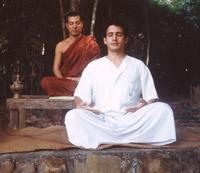
I also learned much about Buddhism from Pra Uttamo (originally Robert Bender), another Buddhist monk (and American Jew) who lived alone in the forests of Sungai Kolok, a Thai village near the border with Malaysia. A former physicist who became a monk in 1959, he was a sage, a comedian (classic Jewish sense of humor), and great friend until his tragic murder in 1999 at age 70 (May his memory be a blessing).
Afterwards, I produced a “Yoga for Health” television program on a local channel (13 half hour presentations). I continue to practice Yoga everyday and teach a Yoga class at a local college (in Jasper, Indiana).
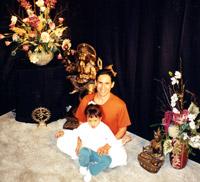
Medicine over Writing
So much for the formative years. I had always been interested in writing and at one point wanted to be a journalist. I took courses in English and Political Science and my English Professor and Political Science department chairman wanted me to major in their respective fields based on essays I had written; they were both aghast when I informed them that I had decided to go into – carpentry. This because of my involvement in Rudi’s Work and the Ashram, into which I moved soon after.
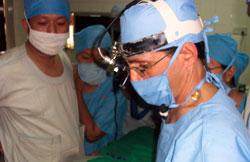
The mind and intellect, as the teaching went, were obstacles to spiritual growth. Physical labor, on the other hand, would breakdown tensions and dangerous illusions, provide insight and ultimately set you free. So Rudi’s work, or my interpretation of it, moved me into an anti-intellectual mode and away from my first love, which was writing.

From carpentry, it progressed to Medicine, a brutal almost physical form of mental labor that would serve the same purpose. Fifteen years later, I was an Otolaryngologist-Head and Neck Surgeon with a sub specialty in Facial Plastics.
I received my Medical Degree from the Indiana University School of Medicine in 1981 (living simultaneously in an ashram in Bloomington and then Indianapolis). I was board certified in Otolaryngology in 1986, after completing my residency at the NY Eye and Ear Infirmary (lower Manhattan). I performed a fellowship in Facial Plastics in 1987 at the University of California in San Francisco.
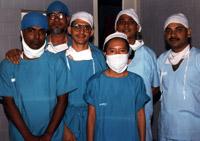
I managed a number of peer reviewed articles in the medical literature and probably should have gone academic but did not. I did little of a creative bend. Still, my interest in writing never disappeared.
The Wonder Years
I had a severe case of itchy feet (wanderlust) that managed only to find expression after concluding my medical training. In 1987, after my Facial Plastics Fellowship, I went to Asia, which, at the time, I considered to be my true spiritual home. My purpose was adventure - in a part of the world I found fascinating - while simultaneously helping others in developing countries.
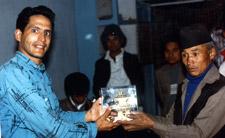
I worked in Thailand, Nepal, India, and Bangladesh. I performed long operations regularly, often under daunting conditions on patients with advanced head and neck cancers. They were heavy smokers there and many also chewed betel nut, a known carcinogen. Oral and throat tumors were therefore among the most common cancers seen and invariably at late stages.

I worked for very little or nothing, depending on where, sometimes not even room and board. Had I been able to earn a nominal amount, say a thousand bucks a month to cover expenses, I never would have left, so fulfilling and rewarding did I find the project. As it turned out, I had to return after three years for lack of funds – a major disappointment.
To this day I maintain warm relations with many colleagues from that era. I continue to do this sort of “mitzvah” (“volunteer”) work on a more limited basis given the constraints of time that come with a private practice and family. My most recent such journey was to Myanmar (Burma). I have lectured frequently about my experiences.
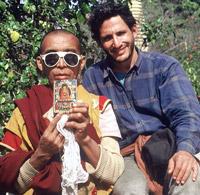
Islam and Bangladesh
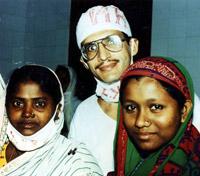
I was probably treated with more kindness and graciousness in Bangladesh, a Muslim nation, than any place I traveled to during those three years. This, despite them knowing I was Jewish. I was frequently asked my religion. Perhaps, because of my swarthy appearance (I’m a Sephardic Jew) they suspected that I was one of them.
The last thing they were expecting to hear was that I was a Jew, especially as the first Intifada was occurring in Israel at the time and the news programs and papers were awash with stories of the conflict between Israel and the Palestinians. Even with this, they endeavored to protect me and avoid embarrassing moments.
I have also visited other Muslim nations (Jordan, Turkey, Morocco, Indonesia, Egypt) and have been privileged to see some of the great examples of Islamic architecture, the Taj Mahal in India and the Alhambra in Spain, for example, among many others, and have admired them greatly. I have also read much on Islamic history and hold in high regard the many achievements of Islamic civilization.
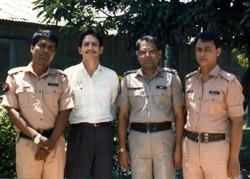
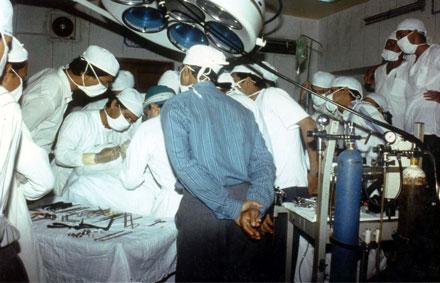
Still, one cannot ignore that today’s Muslim world is in a state of utter disarray: it remains impoverished, provides little if any opportunities for its citizens, lags behind the rest of the world in technology, economic development, human rights, freedom, and democracy, has contributed little if anything to world civilization in centuries, sends millions of its citizens running from it every year to Western nations in search of better lives, and produces large numbers of violent extremists with an appetite for murder and mayhem. The Islamic world is very much in need of repair.
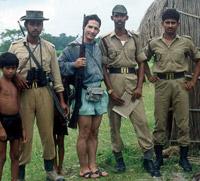
To this day, however, I am in touch with many good Muslim friends. They have visited me and stayed at my house as welcome guests. We have shared respectfully our traditions and I am planning a return visit to Bangladesh.
Although I know from personal experience that there are good Muslims, like many others, I am anxiously waiting for so called “moderates” to vigorously condemn the outrages of Jihadist barbarians, reform their societies, and take back their religion.
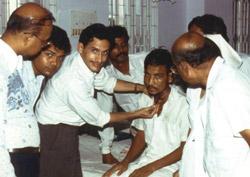
Home again

I ran out of money. I returned home with my wife, Ying (a nurse I had met in Thailand who then accompanied and assisted me on my adventures thereafter), and pennies in my pocket. I lived with my mother for six months until I was on my feet again and set up private practice in Jasper, Indiana in 1991, where I have been since.
Bagels
About five years into private practice, I had an idiotic idea to open a bagel shop on a busy corner in Jasper, small rural town in southern Indiana. I named it “Bronx Bagel,” and brought in all the flourishes of a bagel shop in NY with a heavy Yankee influence including a giant wall mural painted by an old friend, the great Wendell Field, that combined seamlessly the world of NYC and the Yankees with idyllic southern Indiana. Then I opened an Italian restaurant named “Simply Pasta.” I had dreams and ambitions for both, especially bagels, which I wanted to bring to Asia. After three years, I closed them both and have since sold the bagel shop - promising ideas that met untimely fates.
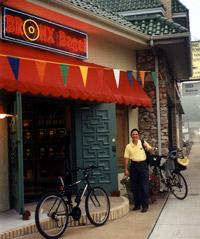
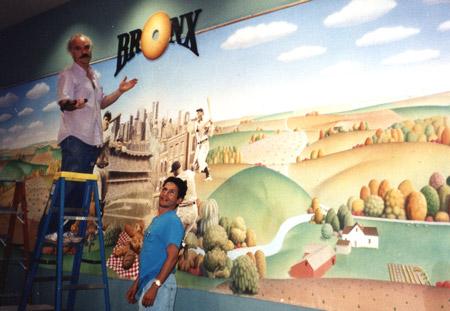
The Return to Judaism
With marriage and family comes religion or at least it should. My wife converted to Judaism (but remains very “Buddhist”) and seems sometimes more Jewish than I. She is truly proud of being “one of the children of Israel” as she referred to herself at the Temple Adath Bnai Israel in Evansville, Indiana during her conversion. She and each of my four children have also been kosher dunked at the Orthodox Mikva in Saint Louis, presided over by Rabbi Barry Friedman (part of the conversion process).
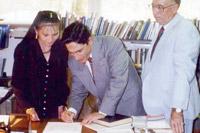

I have visited Israel once (during the buildup to the war in Iraq when no one was there, in 2003, a great time, by the way, to go), and loved it. I think seriously about moving there. It seems only fitting to be at the center of Jewish life, actively defending and participating in the Jewish state – instead of cheering from the sidelines.
Writing
The writing thing continued to burn on a low flame. In college and med school, I wrote columns and travel pieces for local papers. In Asia, I contributed a number of travel pieces, essays, and human interest stories for English dailies in Thailand and Bangladesh, along with medical articles for journals in the US and Thailand.
When I returned from Asia, I wrote a book on my travels, “The Cutting Edge.” I have written another book on the tragic loss of my mother to a stroke, “A Stroke Remembered,” a sweeping canvas of the wrenching experience of living and dying from a stroke with pointed vignettes interspersed about the equally intimidating experiences of growing up poor in the Bronx led by my willful and passionate mother.
There were two screenplays that went nowhere (although placed well in contests) and then the political writings, the op-eds and essays generally published in my local paper, the Jasper Herald, and elsewhere (Indianapolis, Evansville, and other venues).
Conservatism, Israel, and the US
After my roughly three year flirtation with the Left that ended at age 18, I began the slow but irresistible drift toward conservatism. The formal conversion, however, did not happen overnight. In 1976, I still found myself pulling the lever for Carter. But by 1980, I began to feel strange pangs of guilt and anxiety, almost like a “coming out” experience, I guess, as I nervously recognized that I sort of liked this Reagan guy and what he stood for. This, I could admit to no one at the time, even as I could no longer deny it to myself.

My respect for Reagan only grew with the passage of his successful two terms. Still I knew nothing of the intellectual underpinnings of conservatism. That all changed after receiving my first copy of National Review in 1992, which I hungrily devoured. I have been a faithful subscriber since. To that, I would add regular subscriptions to the Jerusalem Post and Commentary and of course listening daily to Rush.
Thus, I could now begin to put into words what I felt instinctually – that the principles of conservatism, of limited government, low taxes, a strong defense, and traditional values, represented the only governing philosophy that would enable the US to remain what it was – the last, best hope of mankind (to paraphrase Reagan).
A vigorous, prosperous, and powerful US was needed to defend Western Civilization against our enemies, whether it be Nazi Germany, the Soviet Union, or the Islamofascists today. Continued US support for a strong Israel was also required to maintain her as a frontline bulwark of democracy and Western values in the Middle East – and as a bastion of Jewish life, culture, and civilization.

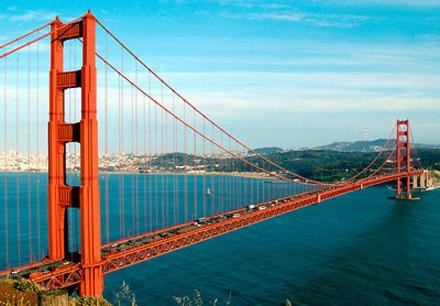
To Blog or not to Blog
Well, then, you may ask, isn’t it superfluous to add yet another conservative voice (or blog) to the burgeoning multitude that already man the barricades in defense of its splendid precepts – the one governing philosophy that assures freedom, prosperity, and success for those submitting to its edicts?
Allow me to state my case:
- First, there is always room for another conservative Jew.
- And I (patiently) await the day when that phrase - conservative Jew - is not an oxymoron.
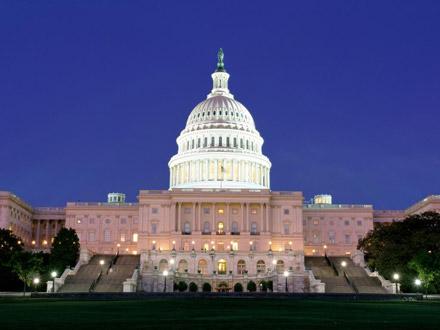
Yes, there are many established conservative Jewish voices well known to followers of the cause, but far more otherwise noteworthy and intelligent Jews still cleave to the pernicious faith of secular liberalism.
On top of which, there are very few conservative Jewish physicians in private practice, amidst real people with real (and imagined) agonies, which alone may make it worth the price of admission.
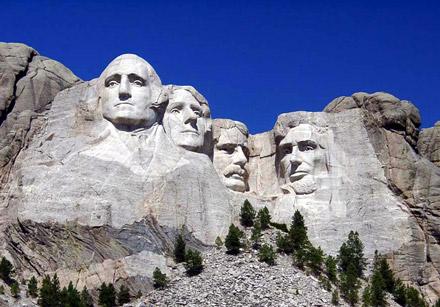
Perhaps, then, it might be useful hearing from a conservative Jewish surgeon (and former leftie), of humble origins, born and raised in the Bronx but now living in rural Indiana (flyover country, the heartland, “Red State” America), doing “real world” things (self-employed in private practice, raising kids), who worked overseas as a volunteer physician including in Muslim nations, has a Thai wife, loves the Yankees, eats vegetarian, does yoga, reads novels, writes poetry, watches foreign flicks, likes sushi, red wine, communing with nature, not to mention bagels and Buddhism, and all sorts of other multicultural, lefty-like pastimes, yet views with disdain multiculturalism, moral relativism, political correctness, the liberal media, the UN, Europe, and left wing professors; who sees liberal secular progressivism as a corrosive, debilitating dogma eating away at the heart of Western Civilization (Europe is already on its deathbed), who views it as a creed that weakens our resolve and impairs our will, that is uncomfortable with American power, hostile towards our military, guilt ridden over past American “sins,” perceives the US as a sinister, racist, and imperialistic force and is philosophically and morally incapable of responding to threats or defending the nation: a political and cultural ideology, in other words, that would assure our decline and, perhaps, actively seek it.
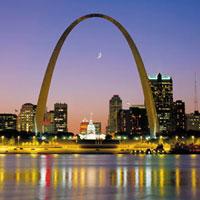

So, I will toss my two cents in with the growing chorus that argues on behalf of Western Civilization, Capitalism, the Judeo-Christian tradition, the Enlightenment, of faith and reason, the US and Israel, conservative principles, and waging an aggressive war against Islamic Jihadism - while keeping a watchful eye on Russia, China, North Korea and other threats as they emerge.

Another point: a private practice filled with people of all ages including lots of kids and their parent/caregivers, is a marvelous window on the status of American society and the American family – the picture, I’m afraid, is not pretty – in fact, quite saddening.

From time to time, I may write something relevant to medicine or malpractice or pharmaceutical companies - or perhaps a slice of poetry, a chapter from a book, a travel piece or something on religion, particularly Judaism – not to mention observations from the frontlines of private practice. For the most part, though, it will be the red meat of national and international politics and culture.

Running for Office
More recently, particularly as I watched the nation spiraling downward, first under the inept, Hoover-like Presidency of George W. Bush, and then at break neck speed under the leftist presidency of Barack Hussein Obama, I realized that I could no longer continue just criticizing from the sidelines with articles and blogs. I decided I had to enter the political arena and seek elected office.
I flirted with a run for Congress in Indiana’s 9th district for 2010, the Tea Party year, a wave election sweeping Republicans into power in the House, and a great year to have run, but ultimately withdrew because of the difficulties of running such a campaign while maintaining a solo practice. I then took the plunge for a state seat, a more reasonable compromise considering my private practice, and sought the Republican nomination for State Representative for Indiana’s 63rd district, announcing in 2013 for the primary in May of 2014.
I ran as a reform minded grassroots constitutional conservative, fighting to restore state sovereignty and to rein in an out of control federal government. I spoke of the need to rebuild our broken culture and family, and to reinstate family and faith as the twin pillars of our communities. I argued for a vision of state activism beyond budgets, roads, and schools, as important as those matters were, as a vehicle for blunting an all-powerful central government. These and other conservative issues animated my campaign.
The process was bracing, a full-throated effort with volunteers, fundraisers, parades, festivals, interviews, phone banking, yard signs, door knocking, banners, ads, radio and TV interviews, speeches, and events. I met many good, deeply concerned Hoosiers. In the end, I was defeated by a very capable candidate, a highly successful local businessman with deep roots in the community, well-funded, backed by business interests and the state party. That gentleman, Mike Braun, went from state representative to US Senator, and is performing admirably. We communicate with one another and remain good friends and political allies.
In 2016 and 2018, I ran in the Republican primary for US Congress representing Indiana’s 8th district against Republican Congressman Larry Bucshon, a fellow physician. I believed his record to be insufficiently conservative and described him accurately, I believe, as a RINO. Indiana’s 8th district is geographically large with some 18 counties. It was quite daunting to get around to all the events, parades, dinners, and meetings, particularly while maintaining a busy solo medical practice. But we did. The issues at the congressional level were more in my wheelhouse having to do with national and international matters. We ran an aggressive campaign, but Bucshon beat me handily. I learned, after two such runs, that it is especially challenging to defeat an incumbent of the same party, in other words, to “primary” him. 2010 was the year to have gotten in, with Democrats holding the seats but in a “red wave” banner year. Both Larry Bucshon and Todd Young were of the class of 2010. It should have been my year, but alas, it was not to be.
Nonetheless, I enjoyed myself, learned a lot, and met many great patriots. I will continue writing books and blogs, produce podcasts and videos on current topics, speak out on the issues, and organize on a local, grassroots level. Given the division and fracture of the country at the national level, it is at the county level, as in “red” counties, and then red states, where I believe we have our best chance to preserve a sanctuary for our God-given and Constitutional rights and liberties, and, perhaps, save the nation.